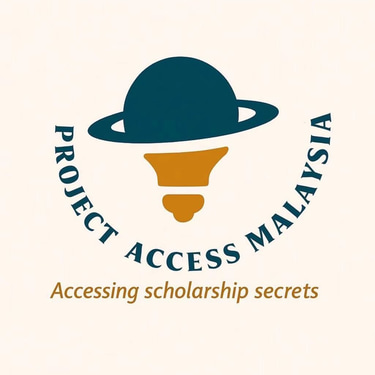SPM 2025 COMING UP - GOOD LUCK YOUNG MALAYSIANS!
5 Common Scholarship Mistakes That Cost Malaysian Students (And How to Avoid Them)
2/18/20253 min read


Securing a scholarship in Malaysia is competitive. Many talented students miss out on fantastic opportunities not because they aren't qualified, but because they make avoidable mistakes - often due to a lack of awareness. After having countless applications ourselves (yes, admin also a past scholar years back), we've identified the top pitfalls that hold students back.
1. The "Grades Are Everything" Myth
The Pitfall: Many students believe that a string of A's in their SPM is a golden ticket. They pour all their energy into academics and neglect everything else.
The Reality: Scholarship committees are not looking for robots; they are looking for well-rounded future leaders. Your grades are your ticket to the door—they get you shortlisted. But once you're in, your personality, leadership experience, and communication skills are what win the award.
How to Avoid It:
Develop a Portfolio of Experiences: Actively participate in clubs, sports, or societies. Take on leadership roles like President, Secretary, or Event Coordinator. Winning competitions will be a major plus points
Volunteer: Community service shows empathy, social awareness, and a willingness to contribute beyond yourself.
Document Everything: Keep certificates, photos, and notes about your responsibilities and achievements in these roles.
2. The Scattergun Approach: Applying for Everything
The Pitfall: A student applies for 30 different scholarships in a single afternoon, using the same generic essay and documents for every single one.
The Reality: Committees can spot a generic, copy-pasted application from a mile away. It shows a lack of genuine interest and effort.
How to Avoid It:
Research and Target: Be strategic. Identify 5-10 scholarships that genuinely align with your chosen field of study, your values, and your background.
Tailor Your Application: For each application, research the organization's mission and values. Customize your personal statement to explain why you are a perfect fit for that specific sponsor.
Quality Over Quantity: Five well-researched, passionately written applications are far more effective than fifty generic ones.
3. Underestimating the Power of a CV
The Pitfall: "I just finished school, I don't have a CV." This is one of the most common and costly mistakes.
The Reality: A Curriculum Vitae (CV) or resume is your professional story. It is a structured, one-page summary that gives the committee a quick, powerful overview of who you are beyond your exam slip.
How to Avoid It:
Create a CV, Even as a Student: Include your academic achievements, co-curricular activities, leadership positions, volunteer work, internships, and even relevant hobbies or skills (e.g., coding, public speaking, graphic design).
Make it Look Professional: Use a clean, easy-to-read format. This shows you are serious and organized.
Start early! As far as 2-3 years back if possible: If you are still in secondary 2 or 3, and you're reading this, start preparing early - a good CV starts with substance accumulated over the years.
4. Ignoring the "Bond" and Fine Print
The Pitfall: A student wins a full scholarship to study engineering overseas, only to discover after accepting that they are bonded to work for the company for 5 years in a role they may not want.
The Reality: A scholarship is a contract. Not understanding the terms can lead to a significant financial and professional burden later on.
How to Avoid It:
Always Ask: Is this scholarship bonded? If so, for how many years? Where will I be required to work?
Read the Agreement Thoroughly: Understand the renewal criteria. Most scholarships require you to maintain a minimum CGPA each year. Know what is expected of you to keep the funding.
5. The Last-Minute Rush
The Pitfall: Waiting until the day before the deadline to start the application. This leads to careless errors, missing documents, and a poorly written essay.
The Reality: Rushed work looks unprofessional. It signals to the committee that you are not truly committed.
How to Avoid It:
Start Early: Begin preparing your core documents (CV, scanned certificates, personal statement drafts) even before applications open.
Create a Schedule: Mark application deadlines on a calendar and set personal deadlines to have each application completed at least 3 days before the actual due date.
Proofread, Then Proofread Again: Ask a teacher, parent, or friend to review your application for spelling mistakes, grammar, and clarity. A fresh set of eyes can catch errors you missed.
Your Key Takeaway
Winning a scholarship is a project that requires strategy, self-awareness, and diligent effort. By avoiding these common pitfalls, you move from being just another applicant to becoming a standout candidate that committees will remember. Good luck
